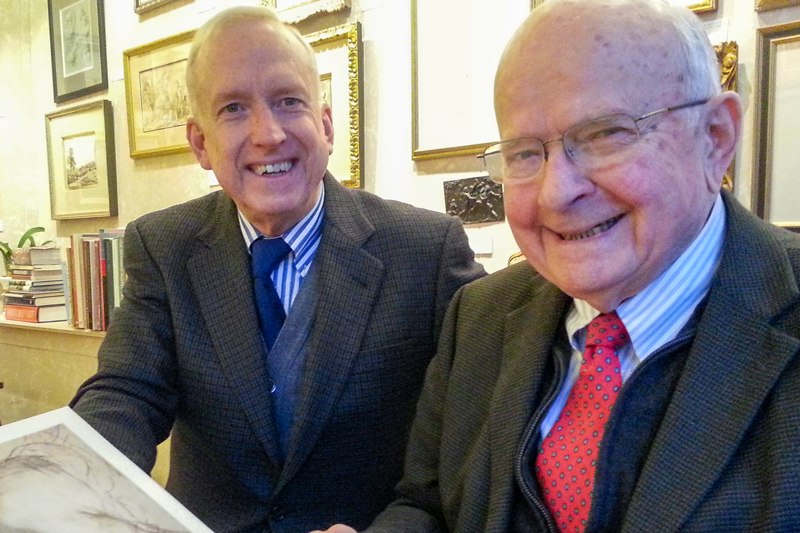-
About
- Departments & Offices
-
Academics
- Physician Assistant
- Special Master’s (MBS)
-
Admissions & Financial Aid
- Tuition & Fees
-
Student Experience
-
- Student Resources by Program
- Academic & Student Support
- Wellness & Wellbeing
- Student Life
- Events & Traditions
-
-
Research
- Research Labs & Centers
- Tufts University-Tufts Medicine Research Enterprise
-
Local & Global Engagement
- Global Health Programs
- Community Engagement
Cultivating empathy in medicine through Balint Groups
The Law/Stroud Foundation brings an innovative pilot program to life

“He never separated his vocation from his life.” This is how Steven Law describes his husband of 45 years, the late William “Donald” Stroud, A45, M48, who graduated from Tufts University School of Medicine and practiced general and family medicine for four decades. This fall the Law/Stroud Foundation, established in Stroud’s memory, made its first gift—a contribution to Tufts medical school. The gift will support Balint Groups, an evidence-based program to help Tufts medical students integrate empathy and compassion into the practice of medicine.
“The idea of the life-cycle was important to Donald,” says Law. “He often spoke of bringing a baby into the world in the morning and pronouncing an older man dead that evening. Each was a natural process in the life cycle.” During and after his medical career, Stroud remained an avid student of the field, passionate about innovation and clinical excellence. Although his years of practice came before terms like “patient-centered care” were commonplace, the ethos of compassionate care was natural to him. “He loved his patients,” says Law, and they cherished him in return.
After they retired from their respective careers in ministry (Law) and medicine (Stroud), they opened Decouvert Fine Art, a gallery in Rockport, MA, specializing in Old Master drawings from the 16th century to modern times. Through the Law/Stroud Foundation, Law hopes to advance their shared values; its mission, crafted by its Board of Directors, is “to promote human well-being” through many channels, including projects aimed at “increased empathy in medicine.” A source of inspiration to them both was Stroud’s longtime mentor and friend, Dr. Anna Quincy Churchill, M1917, a Tufts alumna and faculty member who offered critical financial support to help Stroud complete medical school, and shared with him her love of art, music, and culture. “Our lives, and this foundation, are directly connected to that legacy that she initiated in his life,” says Law.
Learning from challenging experiences
Dr. Wayne Altman, Professor and Chair of Family Medicine, is leading a pilot project of Balint Groups for 30 members of the Class of 2023. The program is an excellent fit for the Tufts curriculum, he says, with its emphasis on strong physician-patient relationships.
“There’s so much intensity and rigor with medical education,” says Altman. “Research has shown that one unintended consequence is the degradation of empathy.” Balint Groups, first developed in the 1950’s, have been shown to reverse that trend and are now utilized in over 22 countries. During typical sessions, participants take turns sharing cases that evoked significant emotion, and help one another brainstorm possible approaches, without attempting to solve the case, or analyze the patient. Group leaders from the Tufts faculty create a setting in which feelings, and even mistakes, can be discussed openly.
“We’re able to teach students that in really challenging patient encounters, leading with empathy and curiosity instead of judgment can be much more effective for the patient.” The same is true when students turn this curiosity inward, to ask “What happened for me there? Why did I react that way?”
Tufts hopes to expand Balint Groups to more students next year. Because each physician works with many patients and colleagues, Altman says the potential impacts of Balint Groups are significant. “It's been really gratifying to work with Steven and the Foundation to craft this gift, and honor Donald’s legacy.”
An ‘inextinguishable’ spirit
One gift is limited in scope, Law says, yet a single action can have ripple effects, like a pebble cast into the water. “I think some students will invest in Balint Groups with their heart, soul, mind, and intelligence,” and through them, the program can impact many people. In addition to helping students to reflect on their work and learn from challenging experiences, he hopes it will aid physicians in their role as leaders, to develop systems shaped by respect and compassion. The Law/Stroud Foundation’s support of Balint Groups at Tufts Medical School is one way in which the curious and generous spirits of people like Anna Quincy Churchill and Donald Stroud, live on. “It’s like the name of Carl Neilson’s fourth symphony,” says Law. “They are ‘Inextinguishable.’”